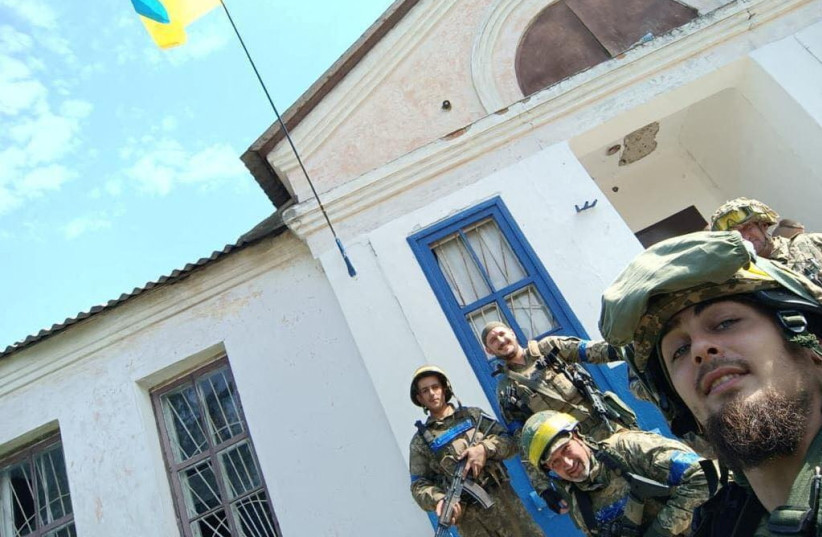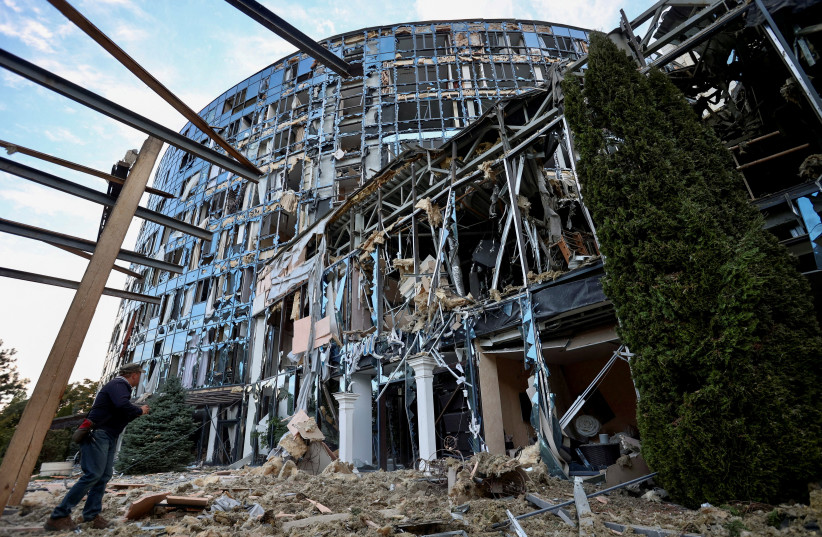 Russia is losing in Ukraine – who will it blame? Analysis
Russia is losing in Ukraine – who will it blame? Analysis
SETH J. FRANTZMAN
If Moscow can blame its Ukrainian separatist partners for its failures, perhaps Russia can save face.
.

Russia’s state-owned TASS news agency published an interesting article on Sunday. The article quoted the head of the “Donetsk People’s Republic,” a breakaway republic that Russia has recognized as a country but which is actually part of Ukraine.
The article claimed that Denis Pushilin, the head of the separatist area, “said the situation along the combat line in the Donetsk People’s Republic is tense but the forces of the people’s militia hold it under control.” In reality, Russia and pro-Moscow forces in the DPR have been seeing huge setbacks as a Ukrainian offensive pushes them back.
The article appears to have been written in order to highlight the failure of the DPR, this breakaway area that Moscow set up as a fake country. Moscow has used the separatist area to fight Ukraine, and as a location in which to put on trial some foreign volunteers and Ukrainians captured by Russian troops.
Russia has been trying to fight the war against Ukraine using non-Russians. Moscow has used the people of Donetsk to fight their fellow Ukrainians since 2014, when Russia first invaded Ukraine and annexed Crimea and set up the Donetsk and Luhansk People’s Republics.
“The situation of the frontline is tense but under control,” the DPR head told TASS. The report also included a claim that DPR forces were “still in control of the airport,” and said “Pushilin described some Ukrainian reports that Kyiv’s forces took the airport as false.”

Pro-Russian forces reportedly complained about NATO-supplied equipment.
A disguised Russian retreat
A second article from TASS said Russian troops were “regrouping” and “redeploying.” These are the propaganda terms used by authoritarian regimes when their forces are retreating.
“In order to achieve the declared goals of the special military operation for the liberation of Donbass, it was decided to regroup the Russian forces stationed near Balakleya and Izyum to boost efforts in the Donetsk direction,” the Russians said.
“According to the Russian Defense Ministry spokesman, for that purpose, an operation of reorganizing and redeploying the Izyum-Balakleya grouping to the Donetsk People’s Republic has been carried out in the past three days,” the report said
Ukraine’s successful counteroffensive
OVERALL, THE recent picture in Ukraine has been one of a successful operation to push back the Russians. In the last days of August, the Ukrainians launched a counter-offensive on the Kherson front line near Mykolaiv. A week later, Ukraine launched a second offensive in the area of Kharkiv.
While it is not entirely clear how well the advances have proceeded on both fronts, the overall appearance is that Ukraine has used a feint in the south to distract the Russians, while the main attack was in Kharkiv. Reports show the Russians being pushed back and numerous areas being liberated by Ukraine.
Losses have been heavy, however. It remains to be seen if weapons supplied by the West, and advice and training, are paying off, and how Moscow will react.
Russia is attending the Shanghai Cooperation Organization this week alongside other authoritarian regimes. It won’t want to be seen as losing in Ukraine. However, if Moscow can blame its Ukrainian separatist partners for the failure and pretend it is fighting the war with these proxies, then perhaps Russia can save face.
Moscow has been reluctant to commit huge numbers of troops and planes to Ukraine, preferring to fight an operation with one hand tied behind its back. This is because Russia wants to fight this war using other people. It hopes to destroy Ukraine without having to sacrifice ordinary Russians, and risk calling into question President Vladimir Putin’s leadership. In short, Russia wants an easy war in which others pay the price for its policies.
What happens when the price begins to grow for Moscow and the humiliation grows?
What happens as the cost of this war and the humiliation of its defeats continue to grow? Russia has already been pushed back on other front lines since it invaded on February 24. At each turn for the worse for Moscow, the regime has shrugged off losses of equipment, launched a few cruise missiles and then settled in for more attrition on the battlefield.
This indicates that Moscow thinks time is on its side. It thinks if it fights in Ukraine for years, as it did in Syria and elsewhere, that somehow it will begin to win because the fighting is done on Ukrainian land. For instance, Europe’s largest nuclear plant at Zaporizhzhia has now been shut down. Clearly, Moscow’s goal is to do war on the cheap, terrorize Ukraine, use proxies and minorities from Russia’s periphery to fight the war, and starve Ukraine of resources. Russia has, for example, tried to take over the trade of grain and other resources.
It’s unclear if Russia will react to the recent Ukrainian offensive. If it prefers to use separatists and proxies to fight and then abandons them or blames them for the debacle, Moscow could be setting up a stratagem that enables it to save face by blaming others. If Russia feels it is losing too much material, it might respond with more attacks on Ukrainian cities. The question is whether NATO powers have equipped Ukraine with the right weapons and defenses to stop any Russian reaction.
Zawartość publikowanych artykułów i materiałów nie reprezentuje poglądów ani opinii Reunion’68,
ani też webmastera Blogu Reunion’68, chyba ze jest to wyraźnie zaznaczone.
Twoje uwagi, linki, własne artykuły lub wiadomości prześlij na adres:
webmaster@reunion68.com
